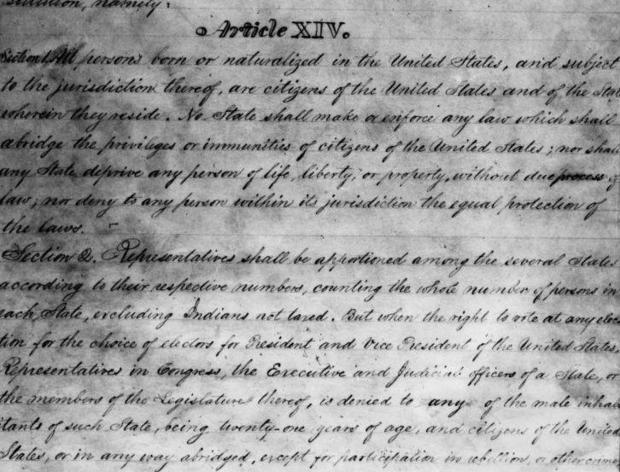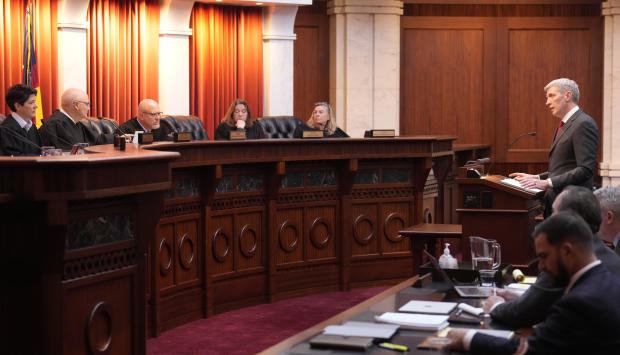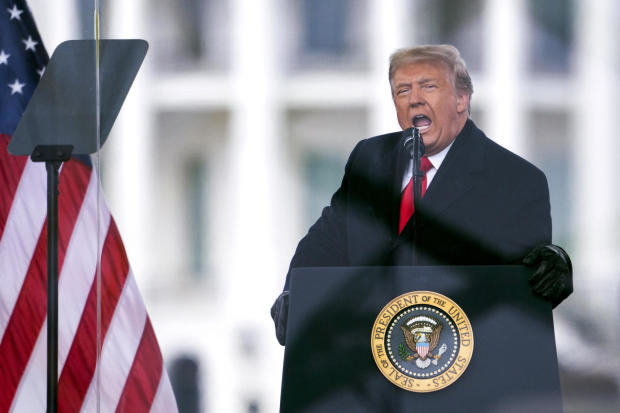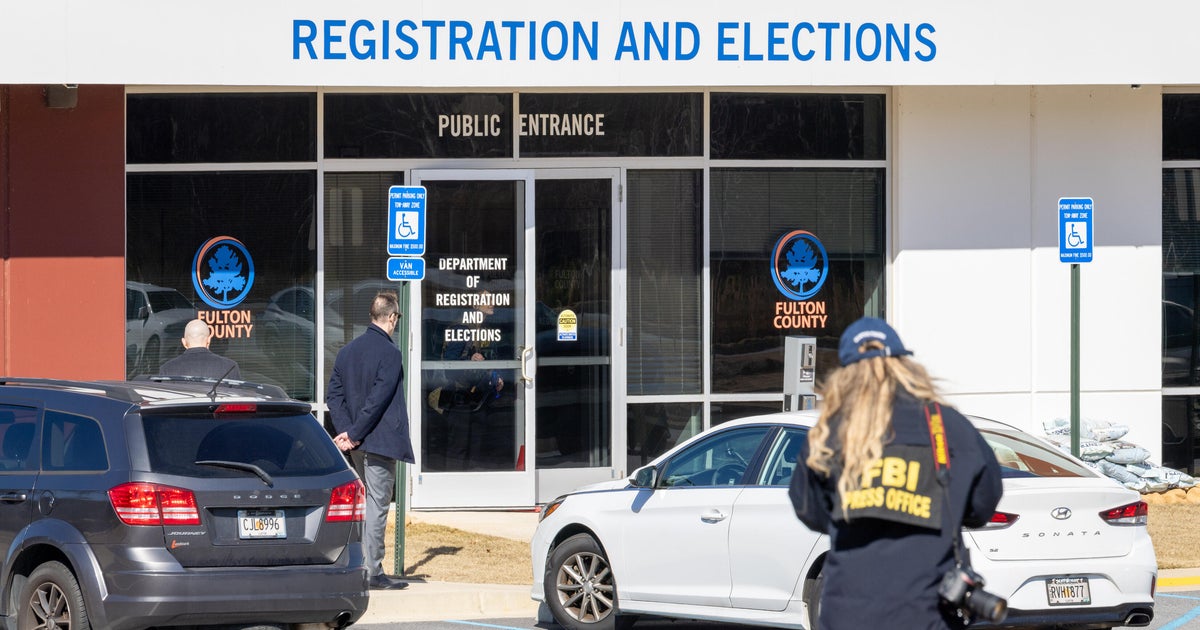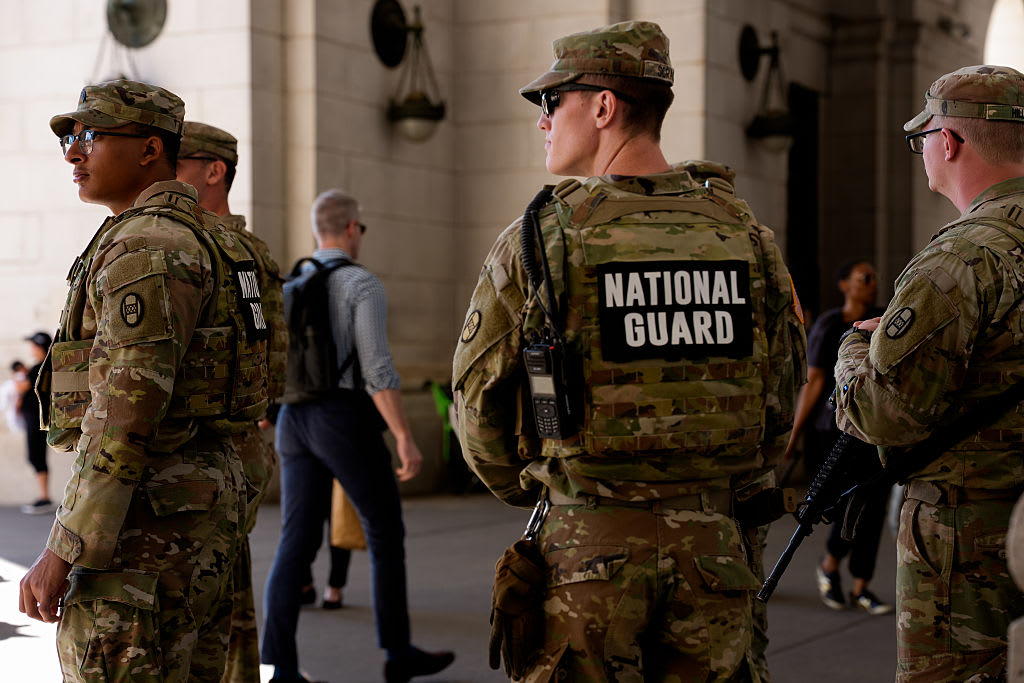The 14th Amendment's insurrection clause and how it's being used to try to keep Trump off the ballot in 2024
Washington — The Supreme Court is poised to hear arguments on Thursday in a milestone case over whether former President Donald Trump is eligible for the primary and general election ballots under the Constitution's insurrection clause, which marks the high court's most direct involvement in a presidential election since its 2000 decision in Bush v. Gore.
The case, known as Trump v. Anderson, landed before the justices after Colorado's highest court issued a landmark decision in December concluding that Trump is disqualified from holding the presidency under Section 3 of the 14th Amendment. With its divided ruling, the Colorado Supreme Court became the first to find Trump should be removed from a state presidential primary ballot, though challenges to his eligibility have been pursued in more than 30 states.
Separate from the legal troubles Trump is facing in federal and state courts, these efforts invoke what is also known as the disqualification clause, Section 3 of the 14th Amendment. The Supreme Court has never before ruled directly on the provision's application, and the case involving Trump will test the reach and force of a constitutional provision enacted in the wake of the Civil War.
The outcome could upend the Republican primary if Trump, the leading candidate for the GOP nomination, is found to be ineligible to seek the White House for a third time.
Here is what you need to know about Section 3:
What does Section 3 of the 14th Amendment of the U.S. Constitution say?
Section 3 of the 14th Amendment states:
No person shall be a Senator or Representative in Congress, or elector of President and Vice-President, or hold any office, civil or military, under the United States, or under any State, who, having previously taken an oath, as a member of Congress, or as an officer of the United States, or as a member of any State legislature, or as an executive or judicial officer of any State, to support the Constitution of the United States, shall have engaged in insurrection or rebellion against the same, or given aid or comfort to the enemies thereof. But Congress may by a vote of two-thirds of each House, remove such disability.
In short, the provision says those who have previously sworn an oath to support the Constitution and then engaged in insurrection against it are barred from holding a variety of public offices. Congress can vote to remove the disqualification.
Why was it enacted?
The 14th Amendment was passed by Congress in 1866 and ratified by the states in 1868. Enacted after the Civil War, the disqualification clause aimed to keep former Confederate civil and military officeholders from returning to serve in the government they fought the overthrow.
Has Section 3 been used before?
Section 3 was primarily used in the time between its ratification and the enactment of the Amnesty Act in 1872, when Congress removed the prohibition for most Confederate officials and their sympathizers, according to the National Archives and Records Administration.
In the 1970s, Congress granted posthumous relief from Section 3 when lawmakers restored full citizenship rights for Confederate Gen. Robert E. Lee and Jefferson Davis, former president of the Confederate States of America.
An 1869 case involving Caesar Griffin, a Black criminal defendant, is considered the first major judicial opinion on Section 3, according to a 2021 law review article from Gerard Magliocca, a law professor at Indiana University who has extensively studied the provision. In that case, Chief Justice Salmon Chase, serving as the circuit judge who heard cases in Virginia, held that the text of Section 3 was not self-executing and therefore could only be enforced through an act of Congress.
But months before Chase's opinion in that case, he reached the opposite conclusion in the treason prosecution against Davis in Virginia. Also serving as a circuit judge, Chase agreed with Davis' lawyers that Section 3 "executes itself."
"It needs no legislation on the part of Congress to give it effect," he wrote. "From the very date of its ratification by a sufficient number of states it begins to have all the effect that its tenor gives it."
Section 3 has seldom been used in modern times. Before the Colorado Supreme Court ruled in the case involving Trump, it had never against a former president.
In September 2022, a state court judge in New Mexico ruled that Couy Griffin, a county commissioner and founder of the group "Cowboys for Trump," had to be removed from his government position and is prohibited from seeking or holding any federal or state office under Section 3.
Judge Francis Mathew of the 1st Judicial District Court in Santa Fe cited Griffin's participation in the Jan. 6 assault on the U.S. Capitol. He was convicted in March 2022 of illegally entering the Capitol grounds and sentenced to 14 days in prison. Griffin received credit for time served.
How did the dispute over Section 3 get before the Supreme Court?
Trump's appeal of the Colorado Supreme Court's ruling stemmed from a lawsuit filed by a group of six voters — four Republicans and two unaffiliated — in state court in September 2023. The suit alleged that Trump is disqualified from holding public office because of the Jan. 6 attack and asked the court to block the Colorado secretary of state from taking any action that would allow him access to the ballot.
In November, a trial court in Denver found that the events on Jan. 6 satisfy the definition of insurrection, and concluded that Trump engaged in insurrection through incitement. But Judge Sarah B. Wallace ultimately determined that the language of Section 3 is unclear as to whether it covered the presidency and the former president, and she ordered Secretary of State Jena Griswold to list Trump on the GOP presidential primary ballot.
The voters and the former president appealed to the Colorado Supreme Court. In December, the state justices ruled 4-3 that Trump is disqualified from holding the presidency under Section 3 and ordered the secretary of state to exclude his name from the state's Republican presidential primary ballot.
"President Trump asks us to hold that Section Three disqualifies every oathbreaking insurrectionist except the most powerful one and that it bars oath-breakers from virtually every office, both state and federal, except the highest one in the land," the four-justice majority wrote. "Both results are inconsistent with the plain language and history of Section Three."
The ruling does not apply outside of Colorado, and the state high court, whose justices were all appointed by Democratic governors, paused its decision to allow Trump to appeal. He asked the U.S. Supreme Court on Jan. 3 to review the Colorado court's ruling.
The high court agreed to take up the issue of Trump's eligibility two days later and set arguments for Thursday, Feb. 8.
Lawyers for Trump and the voters will each participate in oral arguments, as will Colorado Solicitor General Shannon Stevenson, who is arguing on behalf of the secretary of state.
How could Section 3 apply to Trump?
The key questions before the Supreme Court that could determine Trump's eligibility are whether he engaged in insurrection through his conduct surrounding the Jan. 6 attack; whether Section 3 covers the president and someone who has sworn the presidential oath; and whether the constitutional provision can only be enforced through legislation from Congress.
Trump's lawyers have also argued that Section 3 cannot be used to deny him access to the ballot, because it prohibits an individual from holding office, not from running or being elected.
"The Court should put a swift and decisive end to these ballot-disqualification efforts, which threaten to disenfranchise tens of millions of Americans and which promise to unleash chaos and bedlam if other state courts and state officials follow Colorado's lead and exclude the likely Republican presidential nominee from their ballots," they wrote in their opening brief to the Supreme Court.
Lawyers for the six Colorado voters who brought the challenge to Trump's eligibility, though, warned the Supreme Court against waiting to resolve Trump's eligibility, writing in their own filing that it "would be a recipe for mass disenfranchisement, constitutional crisis, and the very 'bedlam' Trump threatens."
Griffin's case, from 1869, is cited repeatedly in Trump's brief to bolster his argument that state and federal courts cannot enforce Section 3 without legislation from Congress. But the Colorado voters told the justices that Chase's opinion was "non-binding" and "does not credibly support the claim that Section 3 is unenforceable here," in part because of his earlier contradictory opinion in the treason prosecution of Davis.
Have other challenges to Trump's eligibility been successful?
Only in Maine have voters challenging Trump's eligibility prevailed. There, Secretary of State Shenna Bellows, a Democrat, issued a decision in December finding that the former president is disqualified from holding office again because of his actions surrounding the Jan. 6 riot.
"I am mindful that no secretary of state has ever deprived a presidential candidate of ballot access based on Section Three of the Fourteenth Amendment," Bellows wrote in her decision. "I am also mindful, however, that no presidential candidate has ever before engaged in insurrection."
Trump appealed to the state superior court, which paused Bellows' decision in a Jan. 17 order. The judge also sent the matter back to Bellows and ordered her to issue a new ruling once the Supreme Court decides the Colorado case.
Bellows appealed the decision to the Maine Supreme Judicial Court, which declined to step in.
In Illinois, the state's eight-member Board of Elections unanimously voted to keep Trump's name on the ballot, finding that the question of whether Trump is disqualified under Section 3 is one for the courts to answer, not the elections board. Five Illinois voters who filed an objection to Trump's candidacy asked a state court to weigh in.
In Massachusetts, the state's ballot commission dismissed a challenge to Trump's eligibility for the Massachusetts primary ballot, finding it did not have jurisdiction over the matter. The voters objecting to his candidacy appealed the decision to Massachusetts' top court, arguing it is "critical" to decide whether Trump can appear on the ballot.
The highest courts in Michigan and Minnesota, meanwhile, have declined to rule in disputes over Trump's eligibility for their primaries, but did not preclude voters from renewing their challenges as they relate to the general election.
Secretaries of state in a handful of other states — including California, New Hampshire and Oregon — have indicated they cannot unilaterally withhold Trump's name from the ballot.
